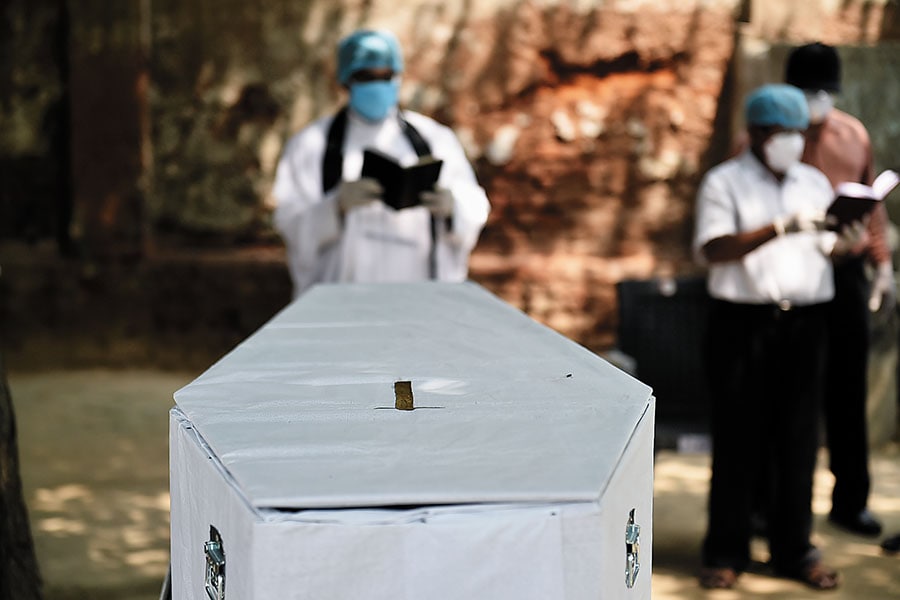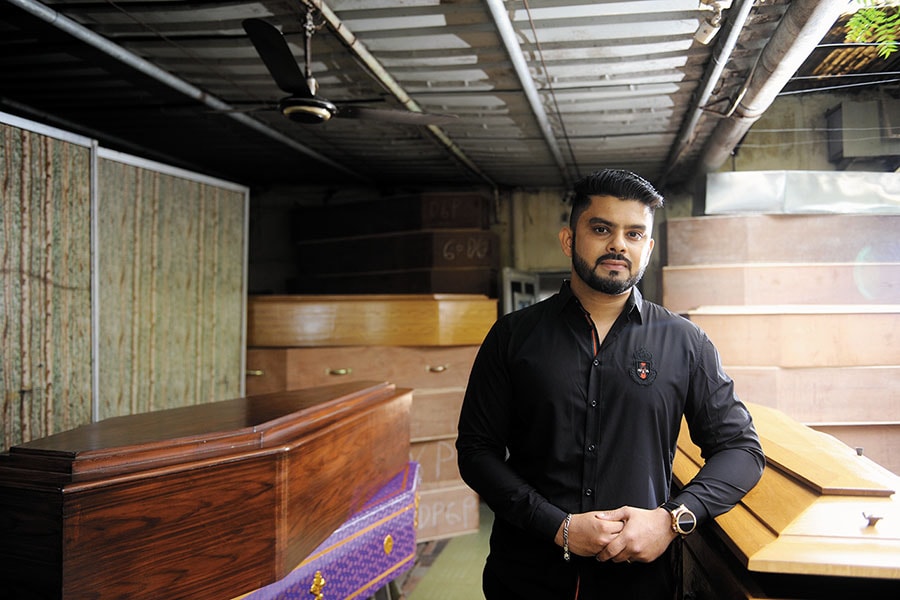
A day in the life of an undertaker during Covid-19
At a time when people had no access to the bodies of deceased family members, undertakers stepped in to give them a dignified farewell, and helped families remotely through mourning and grief
 The undertaking industry had to change the way they conducted funerals during the coronavirus pandemic. While some added transparent lids so that the families could see the deceased, many arranged online funerals and helped relatives in their moment of grief
The undertaking industry had to change the way they conducted funerals during the coronavirus pandemic. While some added transparent lids so that the families could see the deceased, many arranged online funerals and helped relatives in their moment of grief
Image: parul Sharma
Even as emergency services and health care workers kept the focus on survival through a global pandemic, it was also necessary that those who did not make it got a dignified farewell. In the face of isolation and restricted access, undertakers had to adapt to the situation and often step in for families. They had to employ different strategies to cope with the spiralling situation around them. In most states, the government initially restricted private undertakers’ access to the bodies of those who succumbed to Covid-19.
It was an emotionally trying period not just for clients, but also for the undertakers. In the earlier months of the pandemic, when undertakers did not have access to Covid-19 deaths, one of the aspects that made their jobs even more difficult was denying help, sometimes even to close friends and relatives. “People assume that dealing with dead bodies on a daily basis must be the most difficult part of our profession, but it is actually saying ‘no’ to people who need your help the most,” says Lester D’Souza, owner of Lester D’Souza Undertakers and Ambulance Services.
As the number of deaths kept rising, in Mumbai, in August, the municipal authorities permitted private industry players to undertake the burials of those who died of Covid-19.
“After the BMC lifted the restrictions, the number of clients doubled,” says Dion Michael Pinto, proprietor, Danny Michael Pinto Undertakers. He and other private undertakers initially found it difficult to cope with the rising number of clients they had to serve.
“We created special Covid taskforces within Anthyesti’s branches across the country, wherein staff members stepped in voluntarily to aid with Covid funerals,” says Shruthi Reddy, founder of Anthyesti Funeral Services, which has branches in Kolkata, Hyderabad, Chennai, Delhi, Ahmedabad, Jaipur and Bengaluru.
However, many undertakers were also facing a staff crunch since people had left for home and often, in family undertakings, family members shouldered the responsibility. D’souza recalls, “When the lockdown was announced, many of our staff members were confused about the emergent migrant crisis in India, as most of them were from the northern states of the country, like Uttar Pradesh, Madhya Pradesh, Ranchi etc. Because of this sudden panic, they assumed they would be laid off from their jobs. Even most news channels did not provide enough clarity to reassure them. Despite attempts at constant persuasion, a few of our employees left without notice.”
Pinto, too, faced issues with retaining his staff. As both their businesses are family-owned, the job fell on the shoulders of the family. With a shortage of staff and rise of clientele at the same time, it became difficult to serve clients and keep the businesses afloat.
 Dion Michael Pinto, proprietor, Danny Michael Pinto Undertakers, initially found it difficult to cope with the rising number of clients, especially because of staff crunch
Dion Michael Pinto, proprietor, Danny Michael Pinto Undertakers, initially found it difficult to cope with the rising number of clients, especially because of staff crunchImage: Mexy Xavier
The rise in the cost of medical equipment did not help either. Prices of protective gear, PPE kits, sanitisers, gloves, etc doubled, and in some cities, became three times the original price. For instance, says D’Souza, a pack of rubber gloves that cost around `150 before the pandemic, cost him around ₹600 to ₹700, even as of December, 2020. At the same time, families would seek monetary concessions for funerals. “As those were extremely trying times for everybody, we even had to conduct a few free funeral services as our clients simply did not have the financial wherewithal to afford them. So many people lost their jobs... we were left with no choice.”
Despite all this, says Pinto, the focus remained on helping people. “It was never about making money for me. Every day was a new learning process for us. We had to wake up every day with an open mind and adapt to the situation.”
Funerals, streamed online
As people were advised to keep distance and stay apart, the undertaking industry too had to change the way they conducted funerals. While Pinto says they added transparent lids on coffins for the services, D’Souza says they used fibreglass on the top of coffins so that families could see the deceased.
They also had to rely on technology to ensure a safe service. All interactions and arrangements were made online and since many relatives of the deceased could not attend formal funerals, undertakers offered live-streamed funerals so that the families of the deceased could be virtually present.
One of the aspects of undertaking is also guiding grieving families through the tragic event, and this connection suffered. “We don’t just deal with dead bodies, we deal with the family as well. Before Covid-19, we would personally meet the families, console them and guide them through this tough time.” This, however, stopped as undertakers now had to follow strict rules when it came to handling their clients.
“Undertakers would send a specialised team to the hospitals, take the dead bodies without any physical contact with any family member, and conduct the burial or cremation adhering to the social distancing rules prevailing in their cities,” says Reddy. In the case of cremations, the ashes would be sent to a government-run mortuary from where the families had to collect them.
Through these tough times, undertakers did their best to give the deceased and the grieving families their due. As Pinto says, “Our main goal was to adapt to whatever the situation may be and make the process of death, mourning and grief convenient for our clients.”
(This story appears in the 30 November, -0001 issue of Forbes India. To visit our Archives, click here.)




